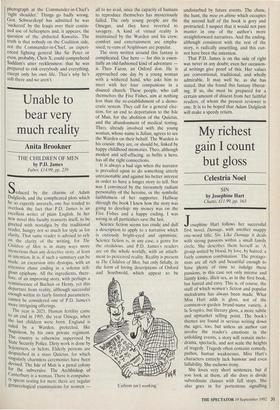Unable to bear very much reality
Anita Brookner
THE CHILDREN OF MEN by P.D. James Faber, £14.99, pp. 239 educed by the charms of Adam Dalgliesh, and the complicated, plots which he so expertly unravels, one has tended to overlook the fact that P.D. James is an excellent writer of plain English. In her new novel this faculty reasserts itself, to he greeted with nostalgia by the traditional reader, hungry not so much for style as for clarity. That same reader is advised to rely on the clarity of the writing, for The C'hildren of Men is in many ways more Mysterious than any detective story, at least in intention. It is. if such a summary can he made, an excursion into dystopia, with an extensive chase ending in a solemn reli- gious epiphany. All the ingredients, there- fore, of an improving story, with perhaps .a reminiscence of Buchan or Henty, yet this departure from reality, although successful enough within its fairly limited parameters. cannot be considered one of P.D. James's more intriguing offerings. The year is 2021. Human fertility came to an end in 1995, the year Omega, when the last children were born. England is ruled by a Warden, protected, like Napoleon, by his own private regiment. The country is otherwise supervised by State Security Police. Dirty work is done by Sojourners, or helots. Elderly persons are despatched in a mass Quietus, for which singularly charmless ceremonies have been devised. The Isle of Man is a penal colony for the subversive. The Archbishop of Canterbury is a woman. There is compulso- ry sperm testing for men; there are regular gynaecological examinations for women — all to no avail, since the capacity of humans to reproduce themselves has mysteriously failed. The only young people are the Omegas, and they have reverted to savagery. A kind of virtual reality is maintained by the Warden and his crew; comfort and entertainment are empha- sised; re-runs of Neighbours are popular.
The story written around this fantasy is complicated. Our hero — for this is essen- tially an old-fashioned kind of adventure is Theo Faron; an Oxford don. He is approached one day by a young woman with a withered hand, who asks him to meet with her four companions in a disused church. These people, who call themselves the Five Fishes, aim at nothing less than the re-establishment of a demo- cratic system. They call for a general elec- tion, for an end to deportation to the Isle of Man, for the abolition of the Quietus, and the abandonment of medical testing. Theo, already involved with the young woman, whose name is JUlian, agrees to see the Warden on their behalf. The Warden is his cousin: they are, or should be, linked by happy childhood memories. Theo, although modest and self-effacing, as befits a hero, has all the right connections.
It is ahvays a bad sign when the narrator is prevailed upon to do something utterly unreasonable and against his better interest in order to have a longer story to tell. Nor was I convinced by the tiresomely radiant personality of the heroine, or the symbolic faithfulness of her supporter. HalfWay through the book I knew how the story was going to develop: my money was on the Five Fishes and a happy ending. I was wrong in all particulars save the last.
Science fiction seems too crude, and dull a description to apply to a narrative which is curiously bright-eyed and optimistic. Science fiction is, in any case, a genre for the credulous, and P.D. James's readers are on the whole worldly, with an attach- ment to perceived reality. Reality is preSent in The Children of Men, but only fitfully, in the form of loving descriptions of Oxford and Southwold, which appear to be 'Cubism isn't working.' undisturbed by future events. The chase, the hunt, the mice en abime which occupies the second half of the book is gory and protracted; I suspect that it would not pass muster in one of the author's more straightforward narratives. And the ending, although consistent with the rest of the story, is radically unsettling, and this can- not have been the intention.
That P.D. James is on the side of right was never in any doubt; even her occasion- al writings give proof of this. Her values are conventional, traditional, and wholly admirable. It may well be, as she has stated, that she found this fantasy liberat- ing. If so, she must be prepared for a certain amount of diSsent from her faithful readers, of whom the present reviewer is one. It is to be hoped that Adam Dalgliesh will make a speedy return.


























































 Previous page
Previous page